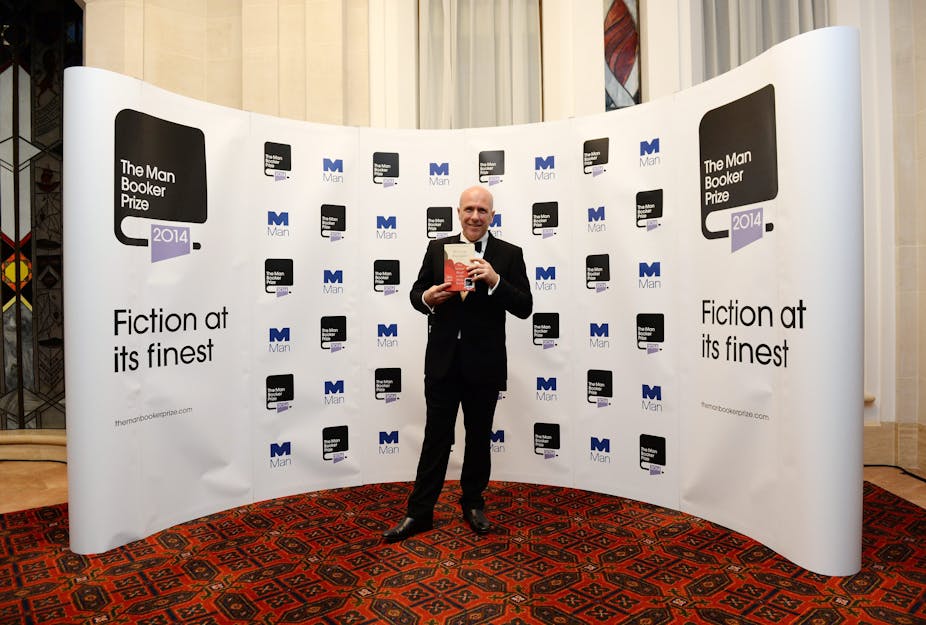This morning the Australian novelist, Richard Flanagan, won the 2014 Man Booker prize for his sixth novel, The Narrow Road to the Deep North.
The novel centres on one of the key events in Australia’s war mythology — the building of the Thai Burma railroad by forced labour under the orders of the occupying Japanese in 1943. Among the 180,000 people pressed into the horrific conditions of the railway’s construction were 1,815 Australian POWs, including Flanagan’s father.
Flanagan joins other Australian winners of the Booker, including Thomas Keneally (Schindler’s Ark, 1982) and Peter Carey (Oscar and Lucinda, 1988; True History of the Kelly Gang, 2002). DBC Pierre (Vernon God Little, 2003) was born in Australia but left more or less permanently at the age of two. JM Coetzee has won the award twice – Life & Times of Michael K (1983) and Disgrace (1999) – but not since he moved to Australia from South Africa in 2002 (he became a citizen in 2006).

Before the announcement of the winner, all the talk leading up to the prize had been about the opening up of the award for the first time to any work of fiction written in English and published in the UK. For nearly 50 years, since the award was inaugurated in 1969, the prize had been for authors from Commonwealth countries (and Ireland and Zimbabwe).
The main fear of this rule-change was that the prize would be swamped by “Americans”. Peter Carey, now an American citizen, was one of several past winners to worry publicly that allowing Americans into the Booker would significantly change the complexion of the award.
The Booker was certainly somewhat unique in being a global prize that was also an American-free zone. There is a complicated anti-Americanism to this view, but it mainly betrays a fear that everything that America does is bigger and brighter and it wouldn’t be possible for the rest of the English-speaking world to compete. Hollywood’s domination of world cinema is an obvious, although rather imperfect, analogy.
The two Americans on the shortlist last night – Joshua Ferris and Karen Joy Fowler – are not household names, and perhaps this muted the controversy that would have erupted if the list had featured the likes of Philip Roth, Thomas Pynchon, Toni Morrison, Don DeLillo, Jonathan Franzen or Jennifer Egan.

Time will tell how “American” the award will become, but in the end the matter rests with the judging panel. It’s important to point out the new rule also includes many non-Americans who write in English but are not from Commonwealth member countries.
As with all awards, the Booker is notable for who has not won it. Martin Amis is one notable British omission. Of the Australian writers, our most popular current literary writer, Tim Winton, has been shortlisted twice (The Riders, 1995; Dirt Music, 2002) without winning.
David Malouf was shortlisted for Remembering Babylon (1993) and Kate Grenville for The Secret River (2006). Our only Nobel-prize winning writer, Patrick White – not counting JM Coetzee – was in fact shortlisted for the Booker, but only under curious circumstances.
In 1970, there was no award because the prize went from being a retrospective one for the previous year to being one for the current year. Thus, the 1970 award was for books published in 1969 and the 1971 award skipped to books published that year — missing 1970.

In 2010, to redress this anomaly, the Man Booker committee announced a shortlist for the “lost” Booker prize of 1970.
Two Australians featured: Patrick White for The Vivisector and Shirley Hazzard for The Bay of Noon. But the award for 1970 went to Liverpool-born JG Farrell for his novel, Troubles.
In other words, the Man Booker still has the capacity to surprise. Flanagan has been lauded as a worthy winner and used his air time to deliver some pointed remarks about Australian politics.
The Narrow Road to the Deep North is a fine novel and one that will surely light the way for future Australian Booker contenders.

